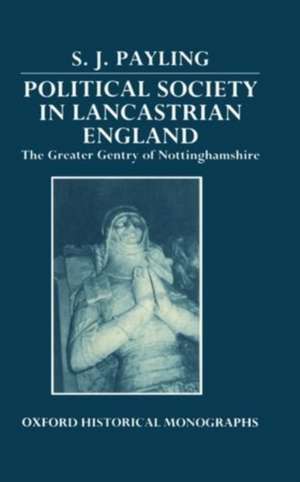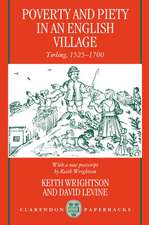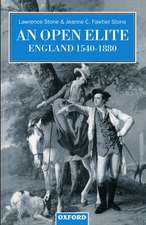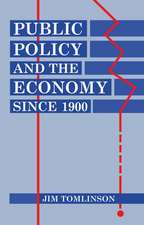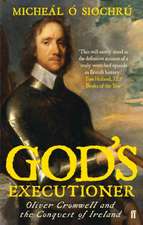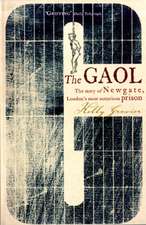Political Society in Lancastrian England: The Greater Gentry of Nottinghamshire: Oxford Historical Monographs
Autor Simon Paylingen Limba Engleză Hardback – 14 feb 1991
Din seria Oxford Historical Monographs
- 30%
 Preț: 497.26 lei
Preț: 497.26 lei - 12%
 Preț: 310.34 lei
Preț: 310.34 lei - 30%
 Preț: 539.99 lei
Preț: 539.99 lei - 15%
 Preț: 244.01 lei
Preț: 244.01 lei - 13%
 Preț: 532.53 lei
Preț: 532.53 lei - 30%
 Preț: 499.46 lei
Preț: 499.46 lei - 30%
 Preț: 497.67 lei
Preț: 497.67 lei - 30%
 Preț: 499.18 lei
Preț: 499.18 lei - 30%
 Preț: 498.68 lei
Preț: 498.68 lei - 30%
 Preț: 604.98 lei
Preț: 604.98 lei - 30%
 Preț: 497.63 lei
Preț: 497.63 lei - 24%
 Preț: 496.31 lei
Preț: 496.31 lei - 30%
 Preț: 498.68 lei
Preț: 498.68 lei - 22%
 Preț: 497.81 lei
Preț: 497.81 lei - 25%
 Preț: 556.27 lei
Preț: 556.27 lei - 14%
 Preț: 539.57 lei
Preț: 539.57 lei - 30%
 Preț: 500.29 lei
Preț: 500.29 lei - 13%
 Preț: 533.57 lei
Preț: 533.57 lei - 25%
 Preț: 569.72 lei
Preț: 569.72 lei - 30%
 Preț: 610.82 lei
Preț: 610.82 lei - 34%
 Preț: 1153.34 lei
Preț: 1153.34 lei - 51%
 Preț: 614.88 lei
Preț: 614.88 lei - 34%
 Preț: 1195.31 lei
Preț: 1195.31 lei - 34%
 Preț: 1035.84 lei
Preț: 1035.84 lei - 34%
 Preț: 1006.40 lei
Preț: 1006.40 lei - 34%
 Preț: 864.39 lei
Preț: 864.39 lei - 34%
 Preț: 1160.09 lei
Preț: 1160.09 lei - 34%
 Preț: 1432.67 lei
Preț: 1432.67 lei - 31%
 Preț: 328.46 lei
Preț: 328.46 lei - 34%
 Preț: 573.88 lei
Preț: 573.88 lei - 34%
 Preț: 1067.93 lei
Preț: 1067.93 lei - 34%
 Preț: 1004.62 lei
Preț: 1004.62 lei - 31%
 Preț: 329.49 lei
Preț: 329.49 lei - 34%
 Preț: 1153.28 lei
Preț: 1153.28 lei - 34%
 Preț: 1254.66 lei
Preț: 1254.66 lei - 34%
 Preț: 946.79 lei
Preț: 946.79 lei - 34%
 Preț: 962.63 lei
Preț: 962.63 lei - 34%
 Preț: 1126.38 lei
Preț: 1126.38 lei - 31%
 Preț: 469.27 lei
Preț: 469.27 lei - 23%
 Preț: 332.04 lei
Preț: 332.04 lei - 28%
 Preț: 374.93 lei
Preț: 374.93 lei - 34%
 Preț: 1049.14 lei
Preț: 1049.14 lei - 34%
 Preț: 1036.73 lei
Preț: 1036.73 lei - 51%
 Preț: 757.67 lei
Preț: 757.67 lei - 34%
 Preț: 1082.61 lei
Preț: 1082.61 lei - 34%
 Preț: 1155.39 lei
Preț: 1155.39 lei - 31%
 Preț: 328.53 lei
Preț: 328.53 lei - 34%
 Preț: 1110.12 lei
Preț: 1110.12 lei - 31%
 Preț: 487.75 lei
Preț: 487.75 lei - 34%
 Preț: 1153.41 lei
Preț: 1153.41 lei
Preț: 802.81 lei
Preț vechi: 1218.77 lei
-34% Nou
Puncte Express: 1204
Preț estimativ în valută:
153.62€ • 160.80$ • 127.86£
153.62€ • 160.80$ • 127.86£
Carte tipărită la comandă
Livrare economică 20-26 martie
Preluare comenzi: 021 569.72.76
Specificații
ISBN-13: 9780198202097
ISBN-10: 0198202091
Pagini: 296
Ilustrații: 14 figures, 16 tables, 13 genealogies
Dimensiuni: 145 x 225 x 24 mm
Greutate: 0.51 kg
Editura: Clarendon Press
Colecția Clarendon Press
Seria Oxford Historical Monographs
Locul publicării:Oxford, United Kingdom
ISBN-10: 0198202091
Pagini: 296
Ilustrații: 14 figures, 16 tables, 13 genealogies
Dimensiuni: 145 x 225 x 24 mm
Greutate: 0.51 kg
Editura: Clarendon Press
Colecția Clarendon Press
Seria Oxford Historical Monographs
Locul publicării:Oxford, United Kingdom
Cuprins
List of figures; List of tables; Abbreviations; The balance of property; The composition of the County elite; The County elite: development and kinship; The baronage and bastard feudalism; Office-holding and the King's affinity; Parliamentary elections and the County bench; Aristocratic crime and the regulation of local conflict; Conclusion; Appendices: I. Nottinghamshire tax returns of 1412; II. Tax assessments of £40 p.a. and over in 1436 And 1451; III. Knightly families resident in Nottinghamshire; IV. Geneological tables; V. Social status and office-holding; VI. The King's affinity in Nottinghamshire; VII. Nottinghamshire elections 1407-1460; Select bibliography; Index
Recenzii
`a meticulously researched and carefully crafted study'Medieval History
`an interesting addition to a distinguished series of studies of county societies in the later Middle Ages produced in recent years'The Ricardian
'Dr Payling performs several useful services to historians in this thoroughly researched and well-presented monograph. His work is a valuable addition to the growing body of research on English landed society in the later Middle Ages. It is a 'county study' which is always careful to situate its subject within a national context and it contains, in its comparative remarks on the changing patterns of inheritance and family settlement, material that clearly invites further elaboration.'Simon Walker, University of Sheffield, History, June 1992
'exhaustive account of the Nottinghamshire gentry in the first half of the fifteenth century ... The chapters are densely packed, but the detail, while minute, never collapses into mere minutiae. Payling is acutely aware of larger historiographical questions, and he is alert to patterns of change. Minor questions of terminology do nothing to distract from the quality, interest, and importance of this book. It is required reading for all those concerned with medieval English elite society in general and with the gentry in particular.'Michael Altschul, Case Western Reserve University, American Historical Review, December 1992
'This book is a useful contribution to the growing body of literature on the local society and politics of later mediaeval England ... his work asks important questions and his answers can only deepen our understanding of life in the later mediaeval shire.'Medium Aevum, Vol. LXII, No. 1
'S.J. Payling's careful examination of the greater gentry of Nottinghamshire represents a more recent generation of scholarship, one that looks beyond the noble ranks of society and focuses instead on the shire ... Payling's study of Lancastrian Nottinghamshire deserves the highest praise. His familiarity with the personalities of the county is profound and impressive ... His work does much more than merely add to a growing stock of local studies; he brings to his research thoughtful questions and strong, satisfying conclusions.'C.J. Neville, Dalhousie University, Albion
'The rival hypotheses are tested here clearly and succinctly in an elegant and model case-study.'Michael Hicks, King Alfred's College, Winchester, EHR Jun. 94
'The work is inevitably painstaking, deeply grounded in the minutiae of estate muniments and property disputes and local administrative structures... Payling has produced a model study of one county, to take its place with the best of the genre.'L. R. Poos, Speculum Journal of Medieval Studies, April 1994
`an interesting addition to a distinguished series of studies of county societies in the later Middle Ages produced in recent years'The Ricardian
'Dr Payling performs several useful services to historians in this thoroughly researched and well-presented monograph. His work is a valuable addition to the growing body of research on English landed society in the later Middle Ages. It is a 'county study' which is always careful to situate its subject within a national context and it contains, in its comparative remarks on the changing patterns of inheritance and family settlement, material that clearly invites further elaboration.'Simon Walker, University of Sheffield, History, June 1992
'exhaustive account of the Nottinghamshire gentry in the first half of the fifteenth century ... The chapters are densely packed, but the detail, while minute, never collapses into mere minutiae. Payling is acutely aware of larger historiographical questions, and he is alert to patterns of change. Minor questions of terminology do nothing to distract from the quality, interest, and importance of this book. It is required reading for all those concerned with medieval English elite society in general and with the gentry in particular.'Michael Altschul, Case Western Reserve University, American Historical Review, December 1992
'This book is a useful contribution to the growing body of literature on the local society and politics of later mediaeval England ... his work asks important questions and his answers can only deepen our understanding of life in the later mediaeval shire.'Medium Aevum, Vol. LXII, No. 1
'S.J. Payling's careful examination of the greater gentry of Nottinghamshire represents a more recent generation of scholarship, one that looks beyond the noble ranks of society and focuses instead on the shire ... Payling's study of Lancastrian Nottinghamshire deserves the highest praise. His familiarity with the personalities of the county is profound and impressive ... His work does much more than merely add to a growing stock of local studies; he brings to his research thoughtful questions and strong, satisfying conclusions.'C.J. Neville, Dalhousie University, Albion
'The rival hypotheses are tested here clearly and succinctly in an elegant and model case-study.'Michael Hicks, King Alfred's College, Winchester, EHR Jun. 94
'The work is inevitably painstaking, deeply grounded in the minutiae of estate muniments and property disputes and local administrative structures... Payling has produced a model study of one county, to take its place with the best of the genre.'L. R. Poos, Speculum Journal of Medieval Studies, April 1994
